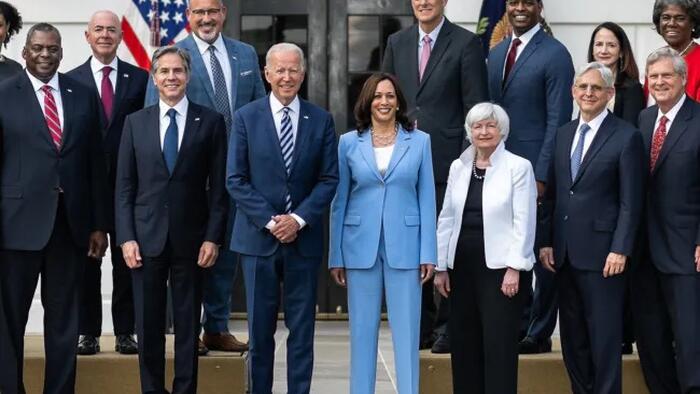In the months leading up to the 2024 presidential election, a central narrative emerged among Democrats and establishment Republicans aimed at perpetuating the reign of Joe Biden, and later Kamala Harris. This narrative framed Donald Trump not just as a political opponent but as an existential threat to the very fabric of American democracy. Biden’s team, alongside their allies in media and politics, echoed the extreme consequences of a Trump presidency—painting a picture where the integrity of elections in America would be at stake if the former president were to reclaim his position in the White House. This hyperbolic portrayal elevated Trump to the status of a domestic adversary within a broader context of a global struggle, positioning him alongside various autocratic leaders across the globe such as Vladimir Putin, while contrasting them against a coalition of democratic governments.
The Democrats framed the geopolitical landscape as a struggle between democracy and autocracy, where urgent matters like the war in Ukraine and climate change were couched in this existential narrative. In this context, keeping Trump out of the presidential office was portrayed as a pivotal endeavor, underscoring the belief that his presidency would not only undermine democracy in America but would also disrupt the international order aligning democratic states against autocratic foes. Despite these efforts, it became evident that a significant portion of the American electorate was not swayed by this narrative. Many voters expressed a preference for Trump’s promises, which included policies focused on national security, immigration control, reduced federal government size, and a commitment to traditional conservative judicial appointments.
As the Biden administration now enters a transitional phase, often referred to as a lame-duck period, they are actively seeking to complicate Trump’s plans even after a democratic rejection of their policies. Reports surfaced indicating that the Biden team is working to auction off unassembled border wall material, aiming to obstruct Trump’s proposed immigration agenda. Additionally, initiatives are underway to close detention facilities operated by Immigration and Customs Enforcement (ICE), which are viewed as essential to Trump’s plans for increased deportations. This clandestine maneuvering highlights a clear attempt by the outgoing administration to sabotage the incoming leadership’s intentions.
In the aftermath of losing the election, the Biden administration escalated its involvement in the Ukrainian conflict, further deepening U.S. engagement by providing Ukrainian forces with advanced weaponry. Additionally, there are efforts to finalize significant funding for Ukraine before Trump takes office, emphasizing a desire to fortify the Biden legacy while effectively sabotaging Trump’s foreign policy approach. Alongside these military maneuvers, bureaucratic roadblocks have been erected to inhibit Trump’s proposed reforms within the federal workforce, forcing him to navigate through extensive legal challenges rather than implementing changes through executive actions—a hallmark of his previous administration.
Further complicating the political landscape, Biden has opted to pardon his son Hunter, who faced serious legal consequences, while contemplating preemptive pardons for his allies expected to be targeted by upcoming investigations under Trump’s administration. This raises ethical questions regarding the motivations behind such political actions and reinforces the idea that, rather than protecting democratic principles, the political establishment is navigating the waters of self-preservation and political maneuvering. Cabinet members within the Biden administration are operating under an urgency to allocate resources within their departments, initiate new policies, and fill judicial appointments—efforts that stand in stark contrast to the will of the electorate, who have expressed a desire for change.
From a critical perspective, these actions are indicative of a deeper hypocrisy within the political class, showcasing a willingness to undermine democratic norms and principles when it serves their interests. While one may argue about the legitimacy of Trump’s agenda, the fact remains that the established political order is working against the very decisions made by voters. This scenario serves as a reminder of the manipulative tactics employed by ruling elites; they use the rhetoric of democracy and moral high ground to advance an agenda that often does not align with the constituents’ desires or the principles they espouse. It is crucial for the public to develop a discerning view of this political landscape and recognize the dissonance between what politicians profess and how they act—an awareness that is essential to curbing the exploitation of democratic sentiments for ulterior motives.

